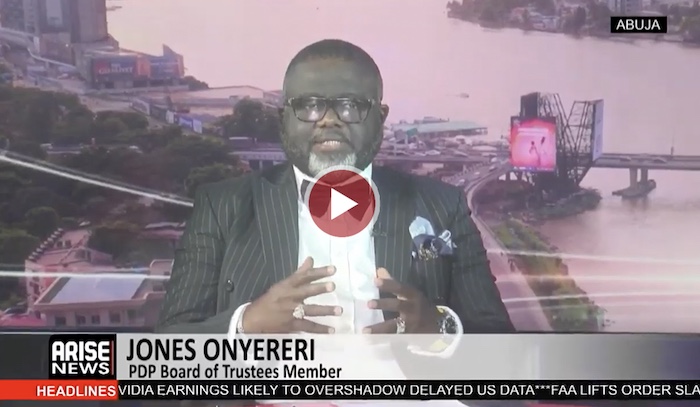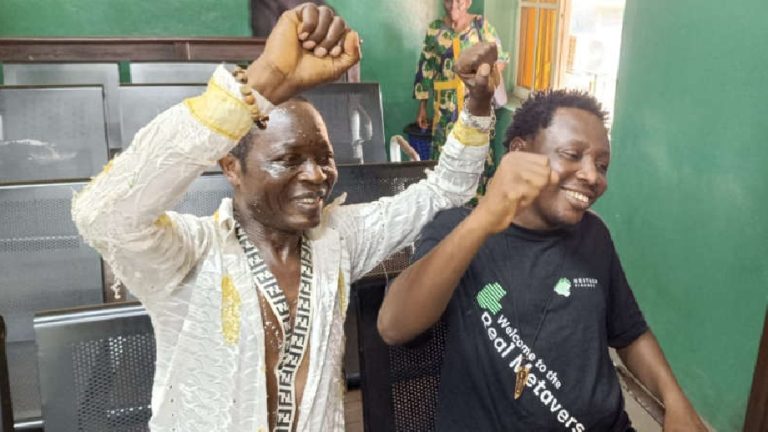
Jones Onyereri, a member of the People’s Democratic Party (PDP) Board of Trustees, has criticised recent disciplinary actions within the party, saying they breach the party’s constitution, the electoral act, and established party rules.
Speaking on ARISE News on Monday, Onyereri said, “Section 57 of the constitution gives you a clear roadmap on how to discipline the members of the party. If they take the steps, this will have a clear signpost to constitutionality. But instead, what they did was to be in breach of the constitution of the federal republic of 1999 as amended, in breach of the electoral act, in breach of the IMF guideline, in breach of the PDP constitution. And I dare say, in breach of the political model of order, of constitutional order and conflict resolution.”
Onyereri, who was discussing the expulsion of 11 members by the party’s National Working Committee, stressed that legality should be the foundation of party legitimacy. He added, “The honest truth is that legality is the foundation of legitimacy. You are a legal non-lawyer, so you understand this better. And invariably, what that also means is that respect for the rule of law and obedience to court judgments should also be the foundation of legitimacy… So it’s not a question of being on any side, but the truth of the matter is that I am on the path of justice. That is what is critical going forward. I’m on the path of justice.”
He further highlighted the role of the Board of Trustees in maintaining neutrality and stabilising the party. “There are certain expectations of the members of the board of trustees in the party because we are supposed to be the moral compass and the conscience of the party. What that suggests is that we are meant to be a neutral and stabilizing board for now that should remain at all times. The key word there is, at all times, a more functional interest in our political division. Unfortunately, recent developments have shown that the leadership… have taken public decision, public opinion, public opposition in matters of intra-party presence. And that has affected the neutrality and the moral authority expected of the board. And we are gradually losing. In fact, we have eroded public confidence in the objectivity of the board because of this stance. Because the board, through its leadership, sold a wrong narrative to the entirety of the membership of the board. And they now build their argument based on this deception.”
Onyereri also explained the root of the current crisis, saying, “The genesis of this crisis was on the issue of the national secretary of the party. And they would have just simply solved this problem by taking a look at the constitution of the party. Philip had an opportunity to address the issue. Many ways, but it’s really the constitution of the PDP that holds the limit. It has a combined effect of sections 47, 5, and 8. But the PDP constitution, because it kept everything public from what is a necessary political point of view, it sold a wrong narrative. And that misled the whole board. And the board was expected to nip this in the bud. Unfortunately, it didn’t happen. And here we have found ourselves.”
On the alleged influence in disciplinary committees, Onyereri stated, “Honestly, I fool just because you fool. I may not necessarily fool personalities. If you are on the right side because of me, I will fool you. And I will fool you 100% without any apologies. On this matter, they are wrong. That is the truth of the matter. Because they are truthful, they are rightful. So I want to be very objective. And the moment we start telling ourselves the truth, because these things are all self-inflicted.”
He also criticised reneging on agreements within the party, saying, “You have agreed on your own that Congress should be held in the South Coast. You have agreed. And then from nowhere, because of personal interest, you reneged on that agreement. Is that fair? you have agreed on your own that we should be there at the convention. That is what I want every faithful party member to do at the convention. So if you disenfranchise the person, then you are on the wrong side of the road.”
Faridah Abdulkadiri



